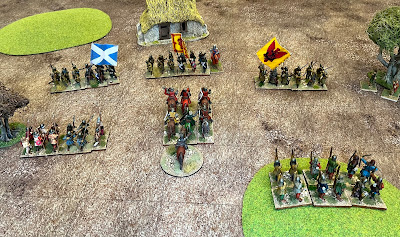I have been a bit slow recently with my chronological Nigel Tranter re-reading project. In part, although this book covers some of the most stirring events in Scottish history, it is also three books and over 1,000 pages.
The first book, The Steps to a Vacant Throne, deals with the period before Robert became King of Scots. Note, not King of Scotland, an important Scottish monarchial difference. Tranter takes a sympathetic approach to Robert's actions in this period, which, while conceding that he supported Edward I against the Scots, also has him as a supporter of Wallace. He even has him rescuing Wallace at the Battle of Falkirk. This history is contested, and some chroniclers have him fighting on Edward's side in this battle. On balance, he was probably not present on either side. Modern nationalism played no part in these struggles, as the landed elite in both countries (outwith the Highlands) largely came from the same Norman stock.
The second book, The Path of the Hero King, covers his accession to the throne after murdering his rival, Comyn in Dumfries church. He was caught napping in the Battle of Methven and was forced to flee to the Isles. Tranter doesn't avoid his romantic interlude with Christina of the Isles while his wife and family were imprisoned by Edward. She is a character in her own right, and I highly recommend a visit to her Castle Tioram in Moidart.
Robert rebuilt his strength with the notable support of the Lord of the Isles and began a comeback on the mainland. He fought a series of small battles against the occupying forces culminating in the Battle of
Loudoun Hill (not far from me). Edward was in the process of another massive invasion when he died. Edward II was not the warrior his father was but was eventually provoked into another invasion, culminating in the Battle of Bannockburn.
Even for most Scots that was the end of the story. However, Tranter rightly covers the post-Bannockburn period in detail in the third book, The Price of the King's Peace. Edward II refused to agree to a peace treaty, despite his problems at home with his own nobles. The Scots raided deep into England, effectively annexing swathes of the border regions to Scotland. There was also a less than effective campaign in Ireland led by Robert's impetuous brother Edward Bruce. Peace was finally agreed after Edward II's death.
For the wargamer, there is an understandable focus on the large battles, particularly Bannockburn. My own club, GDWS, did this battle on the large scale as a display game at
Carronade in 2014. However, this battle was the exception. Tranter brilliantly captures the skirmishes, small battles and raiding that dominated warfare during this period.
Lion Rampant is an ideal set of rules for this warfare, and I dusted down some of my Bannockburn armies for a game last weekend. Naval warfare was also important, along with amphibious landings.
 |
| Islesmen get stuck into English bowmen. |
This trilogy rates as one of Tranter's best. The history may not be perfect, but it's a cracking read.




No comments:
Post a Comment